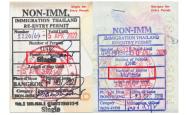In-depth Analysis of Section 65 Ter of the Thai Revenue Code: Non-deductible Expenses and Corporate
About TMA Group
TMA Group is a professional company focusing on local recruitment and corporate consulting in Thailand, dedicated to providing one-stop services including recruitment, financial management, tax disposal, legal consulting, personnel management, etc. for enterprises and individuals. If you need more advice on investment in Thailand, please feel free to contact us.
Section 65 ter of the Thai Revenue Code explicitly outlines a range of expenditures that cannot be deducted when calculating net profit for corporate income tax purposes. These are officially referred to as “prohibited expenses” (ค่าใช้จ่ายต้องห้าม).
This article provides a comprehensive explanation of these provisions based on the official legal text, including:
• The specific types of non-deductible expenses
• The underlying legal rationale
• Common misinterpretations or mistakes made by companies
TMA also offers practical compliance recommendations to support businesses in:
• Achieving legal and efficient tax optimization in Thailand
• Preventing regulatory violations and financial penalties
I. Section 65 Ter of Thailand’s Revenue Code: Non-Deductible Expenses (Verbatim Chinese-Thai Interpretation)
Clause Number Thai Original Text Academic English Translation
(1) เงินสำรอง ยกเว้นเงินสำรองเบี้ยประกันชีวิตที่ตั้งไว้ก่อนการคำนวณกำไร แต่ไม่เกินร้อยละ 65 ของเบี้ยประกันภัยที่ได้รับในรอบระยะเวลาบัญชี หลังหักเบี้ยประกันภัยสำหรับการประกันภัยซ้ำ Provisions, except for life insurance reserves established prior to profit calculation, up to 65% of the insurance premiums received during the accounting period, after deducting reinsurance premiums.
(2) เงินทุน ยกเว้นกองทุนสำรองเลี้ยงชีพตามกฎกระทรวงที่รัฐมนตรีกำหนด Capital, except for provident funds established under ministerial regulations.
(3) ค่าใช้จ่ายเพื่อประโยชน์ส่วนตัวหรือการกุศลที่เกินกว่าร้อยละ 2 ของกำไรสุทธิ และต้องได้รับอนุมัติจากรัฐมนตรี Expenditures for personal benefit or charitable purposes exceeding 2% of net profit, and subject to ministerial approval.
(4) ค่าใช้จ่ายในการรับรองหรือบันเทิงที่ไม่เป็นไปตามหลักเกณฑ์ที่กำหนด Entertainment or hospitality expenses that do not comply with prescribed criteria.
(5) ค่าใช้จ่ายที่เป็นรายจ่ายฝ่ายทุน เช่น การปรับปรุงอาคาร ควรบันทึกเป็นสินทรัพย์และหักค่าเสื่อมราคาแทนการหักเป็นค่าใช้จ่ายทันที Capital expenditures, such as building renovations, should be recorded as assets and deducted through depreciation rather than
TMA Consulting Management has been paying attention to the updating of information through newsletters for many years, but we do not assume any responsibility for the completeness, correctness or quality of the information provided. No information contained in this article can replace the personal consultation provided by a qualified lawyer. Therefore, we do not assume any liability for damages caused by the use or non-use of any information in this article (including any kind of incomplete or incorrect information that may exist), unless it is caused intentionally or by gross negligence.












